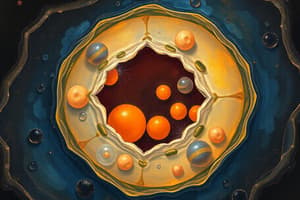Podcast
Questions and Answers
What is the role of lab technicians in cell biology?
What is the role of lab technicians in cell biology?
- Train new staff and manage projects
- Teach future generations of researchers
- Design experiments and interpret data
- Handle laboratory equipment and maintain records (correct)
What is the main responsibility of scientists in cell biology?
What is the main responsibility of scientists in cell biology?
- Train new staff and manage projects
- Handle animals and maintain laboratory records
- Design experiments, interpret data, and publish findings (correct)
- Teach future generations of researchers
What do post-docs do in the field of cell biology?
What do post-docs do in the field of cell biology?
- Interpret data and publish findings
- Maintain laboratory records
- Manage projects, train new staff, and participate in peer review panels (correct)
- Teach future generations of researchers
What is a key task of graduate students in cell biology?
What is a key task of graduate students in cell biology?
What is the primary role of educators in the context of cell biology?
What is the primary role of educators in the context of cell biology?
What is the primary focus of cell biology?
What is the primary focus of cell biology?
Which organelle is responsible for energy production within cells?
Which organelle is responsible for energy production within cells?
What is the function of cell membranes?
What is the function of cell membranes?
What is the process of genetic information translation into protein structures called?
What is the process of genetic information translation into protein structures called?
Why is cell biology important in biomedical research?
Why is cell biology important in biomedical research?
Flashcards are hidden until you start studying
Study Notes
Cell Biology Overview
Cell biology is a fundamental aspect of life sciences, studying the structure, function, growth, division, death, and interaction of cells—the basic units of living organisms. At the heart of cell biology lies the concept of homeostasis, the maintenance of stable conditions within cells despite fluctuations in the environment. Key aspects of cell biology include:
- Organelles: Structures within cells that carry out specialized functions, such as mitochondria for energy production and the nucleus for DNA storage.
- Membranes: Layers of lipids and proteins that surround cells and compartmentalize their contents.
- Protein synthesis: The process by which genetic information encoded within DNA is translated into protein structures essential for cellular activity.
- Replication: The duplicating of an entire cell before it divides into two identical daughter cells.
Importance of Cell Biology in Research
Cell biology plays a pivotal role in biomedical research because human diseases often arise from dysfunctional cell behavior. By understanding cellular processes, scientists can develop targeted treatments for disorders and enhance our overall understanding of human physiology. Additionally, the field of applied cell biology contributes significantly to industrial sectors, including agriculture, nutrition, and cosmetics.
Careers Related to Cell Biology
Professionals involved in cell biology often work in various roles:
- Lab technicians: Those who operate laboratory equipment, handle animals, and maintain laboratory records.
- Scientists: Individuals who design experiments, interpret data, and publish their findings.
- Post-docs: Experts who manage projects, train new staff, and participate in peer review panels.
- Graduate Students: People completing advanced degrees while gaining hands-on experience in research settings.
- Educators: Professors and lecturers who teach future generations of researchers and practitioners.
In summary, cell biology is a crucial discipline within the broader field of biology, contributing to human health, medicine, and technological advances. It requires a deep understanding of molecular mechanisms, cell organization, and how cells interact with their environments.
Studying That Suits You
Use AI to generate personalized quizzes and flashcards to suit your learning preferences.




